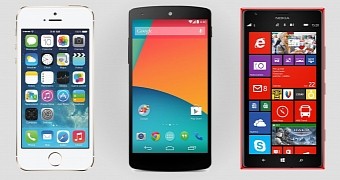Many say that Windows Phone has always played catch-up with Android and iOS, and the recent changes that Microsoft made to its mobile strategy somehow come to confirm that all these efforts have been ineffective, to say the least.
But as far as Balaji Viswanathan, a former Microsoft developer, is concerned, Microsoft racing against Android and iOS was uneven competition because the involved companies had different priorities.
In a post on Quora, Viswanathan explains that Microsoft tried to compete with Apple, despite the fact that the latter was 100 percent focused on the iPhone, while Redmond worked on several other key products at the same time, including Windows and Office.
“Apple put most of its energy on iPhone, while phone was just among the 40 things Microsoft did. For a long time, phone division didn't even come into the top 5 priorities for Microsoft [with a lion's share of attention going to Windows, Office, Online Services and Servers - for obvious reasons]. This was not wrong, but that is the reality,” he writes.
Against Android, Microsoft had to face a wide array of services that were not available on Windows Phone, and this was pretty hard, he explains, because “Microsoft’s comparative services significantly lag those of Google’s.”
Microsoft had two of the toughest rivals in the world
“In short, Windows phone had to compete with two of the best tech companies in the world - one that put phones at its #1 priority and the other expertly leveraging open source community. It was a fool's errand. It is crazy for Microsoft to compete in phones or online services when its real strength is in the enterprise.”
Microsoft seems to have acknowledged this too, so the company is working to overhaul its mobile strategy, while remaining focused on all the other products.
In the long term, Microsoft will launch around six new phone models every year, as it’ll focus on just three categories, namely value phones, business devices, and flagships. Market share in mobile will be less important, as Microsoft is betting on Windows as a whole platform that’s available on all devices, and not just on Windows for phones, and this should help the company remain relevant in the smartphone business.

 14 DAY TRIAL //
14 DAY TRIAL //